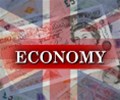

UK doctors are warning that the country is facing a “ticking timebomb” of ill health that is damaging to the economy, as they urged the government to rethink its approach.
Good population health was “essential” for sustainable economic growth, the British Medical Association says in a report.
“A major barrier to improving population health is the perception that economic growth will automatically lead to better health,” it said.
“We challenge this perception in our report as it ignores the complex relationship between economic growth and health.
“Economic growth in itself is not sufficient to improve health and poor population health will ultimately have an inevitable adverse impact on the economy.”
The association said many components of economic growth as measured by gross domestic product were “damaging to population health, nor does population health improve if governments do not distribute the benefits of economic growth to improve health and reduce inequalities”.
The report warned that the health of the UK population is declining and health inequalities are widening.
“Since 2014, life expectancy has more or less flat-lined at around 79.2 years for men and 82.9 for women,” it said.
“In 2020, the impact of Covid-19 led to a further decline in life expectancy, a sharp reversal of previous trends.
“There are also large differences in life expectancy and healthy life expectancy between the most and least deprived areas of the country, which are well-documented.”
Poor population health is not just bad for individual people, it also affect national productivity, the report said.
It said it was “crucial that government underpins all policies with an understanding that the wider determinants of health — namely the conditions in which people are born, grow, go to school, live, work and age — have a greater impact on health than the receipt of healthcare services”.
“For a long time it has been GDP that has been the be-all and end-all when it comes to measuring the success of a nation,” said former BMA president Prof Neena Modi, whose project on human health and well-being is the basis of the report.
“However, the alarming increase in the population prevalence of chronic non-communicable diseases such as diabetes, and the experience of the pandemic illustrating the ongoing threat from infectious diseases, shows clearly that the economy depends on a healthy population.
“GDP is a simplistic number that measures activities and products, including those that actively damage health, and is wholly inadequate as a measure upon which to base policy and judge prosperity and success.
“Government policy at present does not appear to recognise the absolutely fundamental necessity of protecting and improving population health.
“The recent mini-budget with its dash for GDP growth at all costs is a prime example of this mindset.
“Public health budgets have already been depleted over the last decade. Further spending cuts to pay for inequality-fuelling tax cuts will deplete them further.
“With public health spending declining and inequality rising, the price will be paid by a less healthy population that will be less economically productive.”
Source: National News






